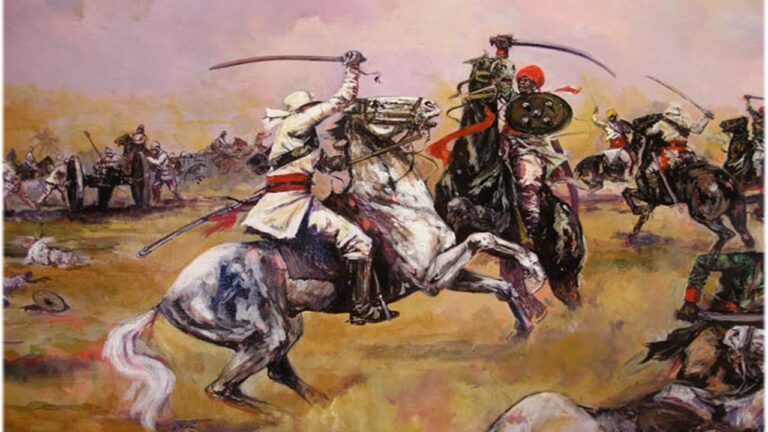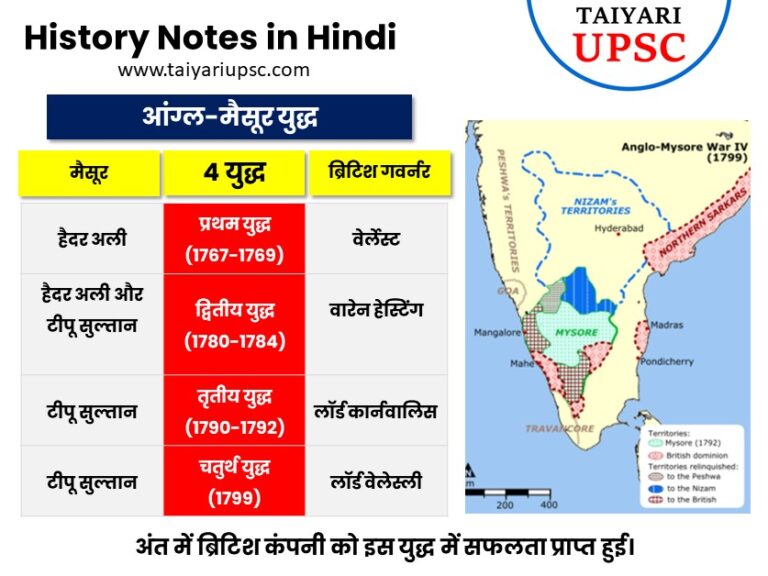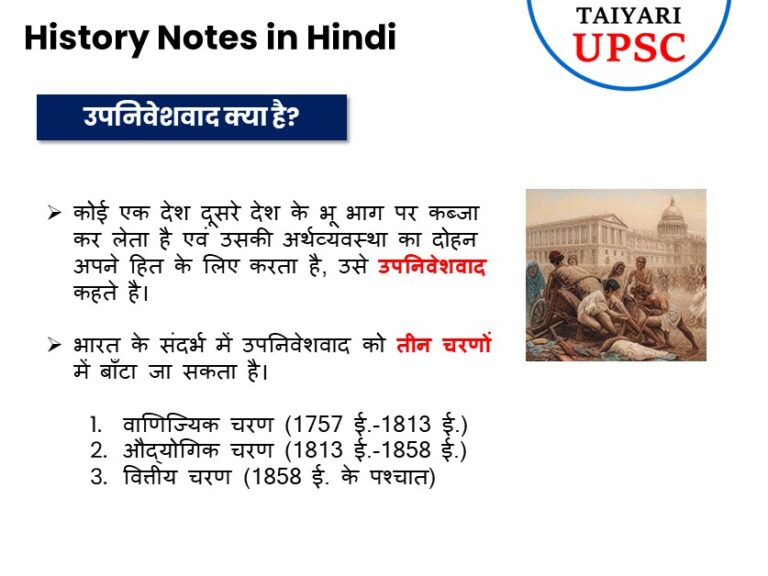Table of Contents
Toggleनमस्कार साथियों, पिछले अध्याय मे आपको Noun के concepts को हिन्दी मे समझाया गया था। आज की पोस्ट मे हम आपके साथ Pronoun in Hindi with Definition, Types and Example के concepts को हिन्दी मे एवं आसान भाषा मे साझा कर रहे है। अतः इस पोस्ट को पूरा पढ़े और अपनी English Grammar की समझ को विकसित करे।
अगर आप SSC CGL, LDC, MTS, Bank तथा अन्य competitive exam की तैयारी कर रहे है तो इस दृष्टि से भी यह पोस्ट आपके लिए बहुत महत्वपूर्ण है।
Pronoun in Hindi Definition
Noun के स्थान पर प्रयुक्त होने वाले शब्द Pronoun कहते हैं, पर हमारा सवाल यह है की Noun के स्थान पर हमे Pronoun का प्रयोग करने के आवश्यकता क्यों पड़ती है?
इसे समझने के लिए हम दो उदाहरण लेते है –
Pronoun Examples
Rahul went to the market. Rahul bought some fruits. Rahul paid for the groceries.
Rahul went to the market. He bought some fruits and paid for the groceries.
पहले उदाहरण मे, Rahul (Noun) का प्रयोग प्रत्येक वाक्य मे किया है गया है, जिससे यह पढ़ने मे यह प्रभावशाली नहीं लग रहा है।
दूसरे उदाहरण में, पहले वाक्य के बाद Rahul (Noun) के बदले He (Pronoun) का प्रयोग किया गया है। जो Rahul (Noun) का दोहराओ होने से रोकता है एवं वाक्य को संक्षिप्त एवं अधिक प्रभावशाली भी बनाता है।
List of Pronouns
Personal Pronouns:
Singular:
- I
- you
- he
- she
- it
Plural:
- we
- you
- they
Reflexive Pronouns:
Singular:
- myself
- yourself
- himself
- herself
- itself
Plural:
- ourselves
- yourselves
- themselves
Emphatic Pronouns:
Singular:
- I myself
- you yourself
- he himself, etc.
Plural:
- we ourselves
- you yourselves
- they themselves, etc.
Reciprocal Pronouns:
- each other
- one another
Demonstrative Pronouns:
- this
- that
- these
- those
Indefinite Pronouns:
- all
- another
- any
- anybody
- anyone
- anything
- both
- each
- either
- everybody
- everyone
- everything
- few
- many
- neither
- nobody
- none
- no one
- nothing
- one
- other
- several
- some
- somebody
- someone
- something
- such
Interrogative Pronouns:
- who
- whom
- whose
- which
- what
Distributive Pronouns:
- each
- either
- neither
Relative Pronouns:
- who
- whom
- whose
- which
- that
Exclamatory Pronouns:
- what
- which
- how
10 Example of Pronouns
- She is going to the market.
- I bought myself a new book.
- I, myself, will take care of the situation.
- They always help each other with their homework.
- This is the dress I‘ll be wearing to the party.
- Everyone enjoyed the concert.
- Who is responsible for this mess?
- Each of the students received a certificate.
- The person who called left a detailed message.
- What a fantastic performance!
Types of Pronoun in Hindi
Pronoun के 10 प्रकार होते है –
- Personal Pronoun (व्यक्तिवाचक सर्वनाम)
- Reflexive Pronoun (स्वतंत्रिक सर्वनाम)
- Emphatic Pronoun (बलाघातक सर्वनाम)
- Reciprocal Pronoun (पारस्परिक सर्वनाम)
- Demonstrative Pronoun (निर्देशक सर्वनाम)
- Indefinite Pronoun (अनिश्चित सर्वनाम)
- Interrogative Pronoun (प्रश्नवाचक सर्वनाम)
- Distributive Pronoun (वितरणवाचक सर्वनाम)
- Relative Pronoun (संयोजक सर्वनाम)
- Exclamatory Pronoun (विस्मयवाचक सर्वनाम)
Types of pronoun with examples
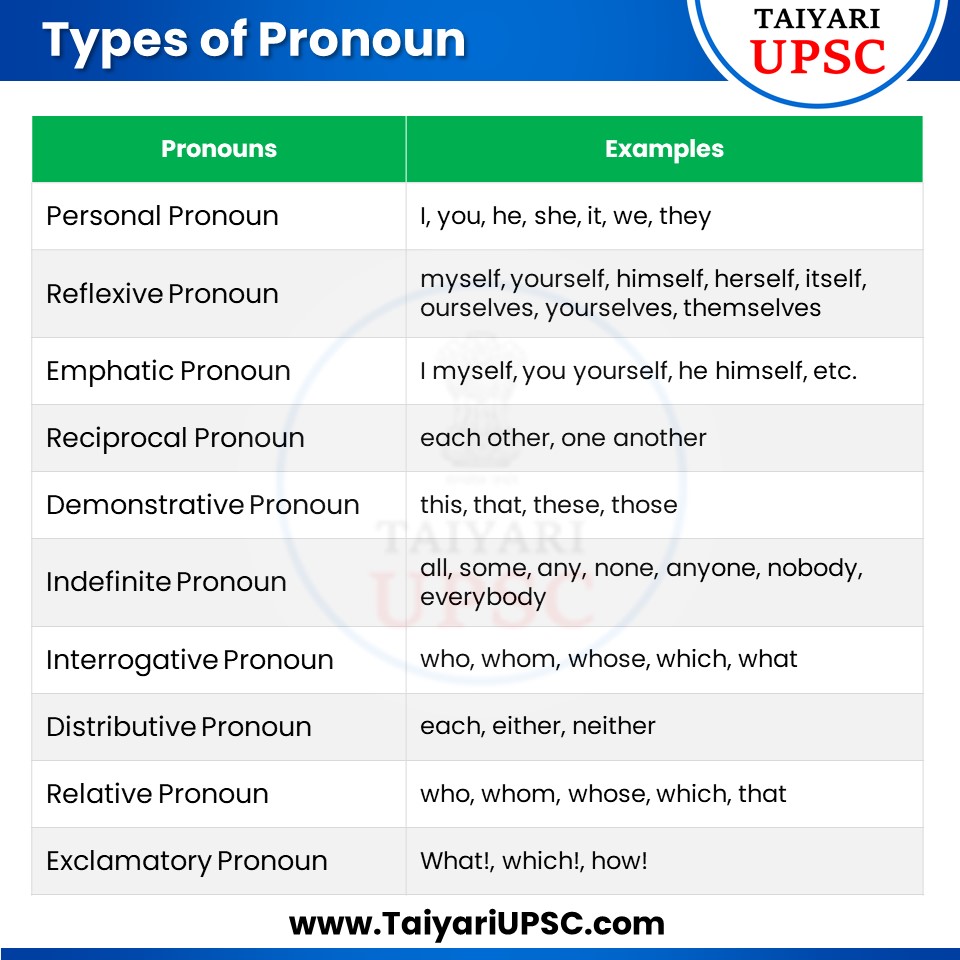
Personal Pronoun:
Examples: I, you, he, she, it, we, they
Sentence: She went to the store.
Reflexive Pronoun:
Examples: myself, yourself, himself, herself, itself, ourselves, yourselves, themselves
Sentence: I hurt myself while playing.
Emphatic Pronoun:
Examples: I myself, you yourself, he himself, etc.
Sentence: She will do it herself.
Reciprocal Pronoun:
Examples: each other, one another
Sentence: They hugged each other.
Demonstrative Pronoun:
Examples: this, that, these, those
Sentence: This is the book I was talking about.
Indefinite Pronoun:
Examples: all, some, any, none, anyone, nobody, everybody
Sentence: Somebody left their umbrella here.
Interrogative Pronoun:
Examples: who, whom, whose, which, what
Sentence: Who is coming to the party?
Distributive Pronoun:
Examples: each, either, neither
Sentence: Each of the students received a certificate.
Relative Pronoun:
Examples: who, whom, whose, which, that
Sentence: The person who called left a message.
Exclamatory Pronoun:
Examples: what, which, how
Sentence: What a beautiful sunset!
Personal Pronoun in Hindi
Personal Pronoun वह Pronoun है जो वाक्य में किसी व्यक्ति, वस्तु या स्थान का बोध करता है। examples – I, we, you, she, he, they etc.
Types of Personal Pronoun
Personal Pronoun तीन प्रकार के होते हैं:
- First Person
- Second Person
- Third Person
First Person: यह Pronoun बोलने वाले व्यक्ति का बोध करता है। उदाहरण: I, we
Second Person: यह Pronoun सुनने वाले व्यक्ति का बोध करता है। उदाहरण: you
Third Person: यह Pronoun किसी तीसरे व्यक्ति या वस्तु का बोध करता है। उदाहरण: he, she, it, they
Use of Personal Pronoun
Personal Pronoun का प्रयोग वाक्य में Subject, Object या Possessive Case के रूप में किया जा सकता है।
Personal pronoun का subject के रूप मे प्रयोग –
First Person:
- I love to spend time outdoors.
- We are planning a trip to the beach next summer.
- I love to play board games.
Second Person:
- You always make me laugh.
- Are you ready to go?
- Your opinion matters to me.
Third Person:
- He enjoys playing sports.
- She is a talented artist.
- They are coming to the party tonight.
Personal pronoun का object के रूप मे प्रयोग –
- She gave the book to me.
- Can you pass the salt to me?
- Sarah invited him to the party.
- They invited us to their wedding.
- We appreciate you helping us.
- I told them the news yesterday.
Personal pronoun का possessive case के रूप मे प्रयोग –
- This is my car.
- Can I borrow my pen back?
- I met his sister yesterday.
- I like her hairstyle.
- The kids are playing with their toys.
Important concepts of personal pronoun in Hindi
Concept 1: यदि कोई Pronoun किसी verb के subject के रूप में प्रयोग किया जाये तो उसे Nominative case में रखा जाता है। Example-
- She went to Patna by train.
- Her went to Patna by train.
Concept 2: अगर कोई Pronoun किसी verb के Object के रूप में प्रयोग किया जाये तो उसे objective case में रखा जाता है। Example–
- She loves him.
- She loves he.
Concept 3: Let अथवा किसी preposition के बाद pronoun को objective case में रखा जाता है। Example-
- Let him do this work.
- Let he do this work.
Concept 4: Possessive Pronoun का प्रयोग किसी verb के subject या object के रूप में किया जाता है। Example–
- Ours is a great country.
- Our is a great country.
- These books are not my.
- These books are not mine.
Note– Possessive Pronoun के बाद किसी Noun का प्रयोग कभी नहीं किया जाता है, जबकि Possessive Adjective के बाद हमेशा किसी Noun का प्रयोग किया जाता है।
Possessive pronoun = Possessive Adjective + Noun.
- Your house is beautiful.
- Yours house is beautiful.
- Your is beautiful house.
- Yours is beautiful house.
Concept 5: जब दो Nominative case pronoun के बीच तुलना हो, तो than के बाद Nominative case Pronoun का प्रयोग होता है। Example–
- You are taller than me.
- You are taller than I.
Note– जब comparison दो object के बिच हो, तो than के बाद objective case pronoun का प्रयोग होता है। Example-
- I love you more than she.
- I love you more than her.
Personal Pronoun Chart
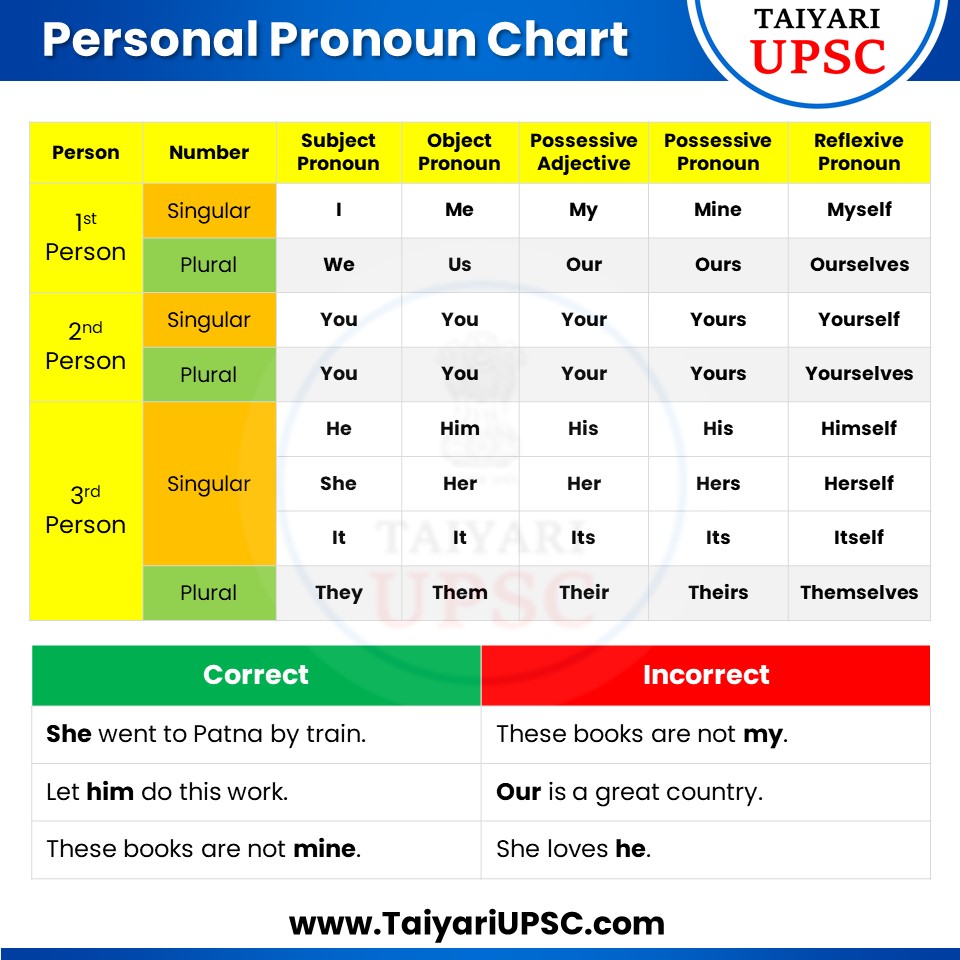
Reflexive Pronoun in Hindi
Reflexive Pronoun वह Pronoun है जब First Person और Second Person के Possessive Case तथा Third Person के Objective case के Singular में self और Plural में selves लगाकर एक नया Pronoun बनाया जाता है, उसे Reflexive Pronoun कहते है।
Examples-
- I washed myself in the morning.
- She dressed herself for the party.
- He taught himself how to ride a bike.
- We enjoyed ourselves at the park.
- They prepared the sandwiches themselves.
Types of Reflexive Pronouns in Hindi
Reflexive Pronoun को निम्नलिखित प्रकार से विभाजित किया जा सकता है:
Subjective Reflexive Pronoun: यह Pronoun Subject के रूप में प्रयोग किया जाता है। उदाहरण:
- I cut myself.
- You hurt yourself.
- He hurt himself.
Object Reflexive Pronoun: यह Pronoun Object के रूप में प्रयोग किया जाता है। उदाहरण:
- You dressed yourself.
- He helped himself.
- She introduced herself.
Emphatic Reflexive Pronoun: यह Pronoun Subject के अर्थ को बल देने के लिए प्रयोग किया जाता है। उदाहरण:
- I did it myself.
- You did it yourself.
- He did it himself.
- She did it herself.
- It did it itself.
- We did it ourselves.
- You did it yourselves.
- They did it themselves.
Emphatic Pronoun in Hindi
Reflexive Pronoun का प्रयोग वाक्य में किसी क्रिया के कर्ता और कर्म दोनों का बोध कराने के लिए किया जाता है। लेकिन जब Reflexive Pronoun का प्रयोग वाक्य में कर्ता पर बल देने के लिए किया जाता है, तो उसे Emphatic Pronoun कहा जाता है।
Examples-
- I did it myself. (Reflexive Pronoun)
- I myself did it. (Emphatic Pronoun)
दोनों वाक्यों का अर्थ एक ही है, लेकिन दूसरे वाक्य में “myself” का प्रयोग कर्ता पर बल देने के लिए किया गया है।
Emphatic Pronoun का प्रयोग वाक्य को अधिक स्पष्ट और प्रभावी बनाता है।
Emphatic Pronoun Example sentences:
- I myself will take care of the chores today.
- You yourself can make a big difference.
- He himself solved the math problem.
- She herself baked the delicious cake.
- It itself can be a challenging task.
- We ourselves organized the event.
- You yourselves can decide where to go.
- They themselves witnessed the amazing performance.
- The team itself celebrated the victory.
- The children themselves cleaned up the mess.
Reciprocal Pronoun in Hindi
Each other तथा one another को Reciprocal Pronoun कहते है। ये दो या दो से अधिक व्यक्तियों या वस्तुओं के बीच आपसी क्रिया को दर्शाते हैं।
Each other का प्रयोग दो व्यक्तियों या वस्तुओं के बीच आपसी क्रिया को दर्शाने के लिए किया जाता है। उदाहरण:
- The two friends helped each other.
- The dogs were playing with each other.
One another का प्रयोग दो से अधिक व्यक्तियों या वस्तुओं के बीच आपसी क्रिया को दर्शाने के लिए किया जाता है। उदाहरण:
- The students helped one another with their homework.
- The animals were chasing one another.
यहाँ कुछ और उदाहरण दिए गए हैं:
- They looked at each other. (दो व्यक्तियों ने एक-दूसरे को देखा।)
- The children played with one another. (बच्चों ने एक-दूसरे के साथ खेला।)
- The friends helped one another with their studies. (दोस्तों ने एक-दूसरे की पढ़ाई में मदद की।)
Reciprocal Pronoun Example sentences
For “Each Other”:
- The twins shared ice cream with each other.
- They exchanged gifts for each other on Christmas.
- We smiled at each other across the crowded room.
- The dancers bowed to each other after their performance.
- The puppies chased each other in the park.
For “One Another”:
- The students congratulated one another on their exams.
- The team members encouraged one another during the difficult game.
- The neighbors helped one another shovel snow after the storm.
- The friends laughed at one another’s silly jokes.
- The birds chirped and sang to one another in the trees.
Demonstrative Pronoun in Hindi
Demonstrative Pronouns का प्रयोग वाक्य में निकट या दूर के noun का बोध करने के लिए किया जाता है।
This और these का प्रयोग निकट के noun के लिए किया जाता है।
That और those का प्रयोग दूर के noun के लिए किया जाता है।
उदाहरण:
This is my book. (यह मेरी किताब है।)
These are my friends. (ये मेरे दोस्त हैं।)
That is your car. (वह तुम्हारी कार है।)
Those are their houses. (वे उनके घर हैं।)
Demonstrative Pronoun Example sentences
- This is the book I was talking about.
- I prefer these shoes over the others.
- Look at that beautiful sunset; I’ve never seen such vibrant colors.
- Is this your pen on the table?
- Those are the flowers I planted last spring.
- I’ll take these cookies, please.
- Have you seen this movie before?
- That is an interesting concept you mentioned.
- I can’t believe these are the only options available.
Indefinite Pronoun in Hindi
Indefinite Pronouns का प्रयोग किसी अनिश्चित संज्ञा के लिए किया जाता है। ये संज्ञा किसी विशेष व्यक्ति, स्थान, वस्तु या मात्रा का बोध नहीं कराती हैं।
Some Examples:
- One should always be honest.
- Someone left their phone here.
- Nobody wants to go to the party.
- Anyone can win the lottery.
- All of the students passed the test.
- Others may not agree with you, but I do.
- No one knows the answer to that question.
- Anyone can help with that.
- A few people showed up for the meeting.
Types of Indefinite Pronouns
Indefinite Pronouns को निम्नलिखित प्रकारों में बांटा जा सकता है:
- Person: someone, somebody, no one, anybody, everyone, nobody, someone else, somebody else, no one else, anybody else, everyone else
- Thing: something, anything, nothing, everything
- Quantity: some, any, none, all, few, several
- Time: sometime, any time, never, always
- Place: somewhere, anywhere, nowhere, everywhere
- Manner: somehow, anyhow, never, always
Indefinite Pronouns example sentences
- Everybody enjoyed the surprise party.
- Someone left their umbrella in the hallway.
- Is there anything I can do to help?
- Nobody wants to miss the exciting event.
- We bought a gift for everyone in the office.
- Something is making a strange noise in the kitchen.
- Everything on the menu looked delicious.
Note– यदि वाक्य में one का प्रयोग subject के रूप में किया जाये तब इसके साथ Possessive case में हमेशा ही one’s का प्रयोग किया जाता है his/her का नहीं। Example –
- One should do his duty.
- One should do one’s duty.
Note– अगर Gender स्पस्ट न हो तो Indefinite Pronoun के साथ Possessive case में हमेशा ही his का प्रयोग किया जाता है।
Interrogative Pronoun in Hindi
Interrogative Pronouns का प्रयोग वाक्य में प्रश्न का बोध करने के लिए किया जाता है। वे वाक्य में किसी व्यक्ति, स्थान, वस्तु या गुण के बारे में जानकारी प्राप्त करने के लिए उपयोग किए जाते हैं। Examples-
- Who is that man?
- What is your name?
- Where are you going?
- What time is it?
- Why are you so sad?
Interrogative Pronouns के प्रकार:
Interrogative Pronouns को निम्नलिखित प्रकारों में बांटा जा सकता है:
- Person: who, whom, whose
- Thing: what
- Place: where
- Time: when, what time
- Manner: how
- Quantity: how much, how many
Interrogative Pronoun Example sentences
- Who is at the door?
- What is your favorite food?
- Which book do you want to read?
- Whose backpack is this?
- Whom did you invite to the party?
- What time is it?
- Which movie do you prefer?
- Who is your best friend?
- What is that noise?
- Whose turn is it to clean up?
Distributive Pronoun in Hindi
Distributive Pronouns का प्रयोग दो या दो से अधिक व्यक्तियों या वस्तुओं में से एक या एक भी नहीं का बोध करने के लिए किया जाता है। Examples-
- Each of the students received a prize.
- Anyone can do it.
- None of the students failed.
Distributive Pronouns के प्रकार:
Distributive Pronouns को निम्नलिखित प्रकारों में बांटा जा सकता है:
- Person: each, either, neither, everyone, everybody, nobody, no one
- Thing: each, either, neither, anything, nothing
- Quantity: each, either, neither, all, none
- Each of the two boys has done this work.
- Each of the five boys has done the work.
- Either of the two boys has come to me.
Either of the two boys has done this work.
Concept 3: दो से अधिक वस्तुओ और व्यक्तियों में से एक का बोध कराने के लिए anyone का प्रयोग करते है। Example–
- Anyone of the five boys has done this work.
- Anyone of the ten boys has come to me.
- Neither of the two boys has helped me.
- None of the four boys has helped me.
Distributive Pronoun Example sentences
- Each student should submit their assignment on time.
- The teacher gave a prize to every student who participated.
- Either of the cakes would be delicious for dessert.
- Neither of the answers seemed correct to me.
- Any of these pens will work for the assignment.
- None of the kids wanted to leave the playground.
- Both of the twins are talented musicians.
- Every flower in the garden is blooming beautifully.
- Some of the students completed their homework early.
- Neither of the options looks appealing to me.
Relative Pronoun in Hindi
जिस Pronoun का प्रयोग वाक्य के दो भागों को जोड़ने के लिए किया जाता है, उसे हम Relative Pronoun कहते है। चूंकि इस pronoun का प्रयोग वाक्य के दो भागों को जोड़ने के लिए किया जाता है, इसलिए यह conjunction का भी कार्य करता है।
List of Relative Pronoun
- who
- whose
- which
- that
- what
Relative Pronoun Example sentences
- The book that is on the shelf is my favorite.
- The person who called left a message.
- Is this the restaurant where we had dinner last night?
- The cake that my mom baked is delicious.
- I like the movie that we watched yesterday.
- The girl whose bag was lost found it in the lost and found.
- The car which is parked in front of the house belongs to Tom.
- Is this the place where we’re supposed to meet?
- The shirt that you bought looks great on you.
- The team that won the championship celebrated all night.
Exclamatory Pronoun in Hindi
वह pronoun जो किसी आश्चर्य, अचंभा या भावुकता को व्यक्त करता है, उसे Exclamatory Pronoun कहते है।
Exclamatory Pronoun Example sentences
- What a beautiful sunset!
- How amazing the fireworks were!
- What a surprise to see you here!
- How delicious this cake tastes!
- What a talented artist she is!
- How incredible the view from the mountain top is!
- What a fantastic performance by the band!
- How lovely the flowers in the garden look!
- What a clever idea you came up with!
- How exciting it is to travel to new places!
Pronoun Exercise
Here’s a multiple-choice pronoun exercise for you. Choose the correct pronoun to fill in the blanks:
1. Sarah and _____ went to the store.
a) I
b) me
c) myself
2. Can you pass the message to _____?
a) he
b) him
c) his
3. The cat cleaned _____ after eating.
a) itself
b) themselves
c) it
4. _____ enjoyed the movie last night.
a) We
b) Us
c) Our
5. Jack and Jill helped _____ with their project.
a) each other
b) themselves
c) they
6. I can’t believe _____ ate all the cookies!
a) she
b) her
c) hers
7. The book on the shelf is _____.
a) mine
b) my
c) me
8. The team celebrated _____ victory with a parade.
a) its
b) it’s
c) theirs
9. Is this the place _____ we’re supposed to meet?
a) where
b) who
c) which
10. _____ is the person I was talking to.
a) Whose
b) Which
c) Who
Answer Key
- a
- b
- a
- a
- a
- a
- a
- a
- a
- c
How useful was this post?
Click on a star to rate it!
Average rating 0 / 5. Vote count: 0
No votes so far! Be the first to rate this post.


